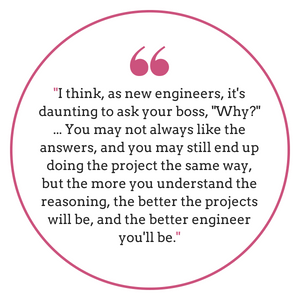I recently had the honor of interviewing ASCE President Kristina Swallow, P.E., ENV SP, F.ASCE, for an infrastructure series we are running on the Civil Engineering Podcast, and afterward was able to ask her a few career-related questions to share with ASCE members here online at ASCE News.
This article is longer than usual, but it’s filled with great advice from Kristina, including a secret at the end that you might find useful when trying to balance your personal and professional lives. Enjoy!
 Anthony: Looking back on your career, what would you have to say are some of the best career development decisions that you’ve made?
Anthony: Looking back on your career, what would you have to say are some of the best career development decisions that you’ve made?
Kristina: That’s a tough one because I’ve had a lot of different positions.
Anthony: Is there something that stands out, though, that helped you advance or grow as a civil engineer that makes you look back say, “Wow, I remember this”?
Kristina: I would say being involved in ASCE. I think that’s the key. Every single job I’ve had has been because of ASCE in some way, shape, or form.
It may have been the person, the network, the skills, they saw me being part of some organization, or even some activity we were doing in my chapter. Or it may have been going to Washington, D.C., through ASCE and then getting the job after that because I had worked in D.C.
I would say, though, that beyond the ASCE involvement, the relocation to Washington really opened my eyes beyond where I was in my practice in Las Vegas and triggered me to think differently about what we as civil engineers do, how we do it, how we should be doing it, and how we should engage more in our work. It really spurred my thinking, beyond what that traditional spectrum is, and has really helped shape my thought patterns with ideas like, “You know, we need to be having more courageous conversations as civil engineers.”
Anthony: Is that maybe because you were thinking more about the advocacy or legislative side of the projects?
Kristina: Part of it was that, but I think part of it was also being exposed to other communities and other perspectives around our profession, and realizing that there are different solutions, and seeing that we can design our projects differently. We can be more systems thinkers, and we can be leaders.
But we have to take that initiative, and we’re not. We’re letting other people lead in a lot of those areas and I don’t think that’s the right direction for us.

Anthony: In regard to career development, what would you be doing if you were a recent civil engineering graduate today, knowing what you know now?
Kristina: Well, I’d certainly be involved in ASCE. I didn’t get immediately involved, but I did get involved soon after graduation. I’d be getting my master’s degree, which I did do then. I started my master’s degree a year after I graduated.
I would be involved with and actively engaged in ASCE, and I think I’d be, probably, more inquisitive than we tend to be. I think, as new engineers, it’s daunting to ask your boss, “Why?” I would encourage all young engineers to ask why, ask why, and learn.
You may not always like the answers, and you may still end up doing the project the same way, but the more you understand the reasoning, the better the projects will be, and the better engineer you’ll be.
Anthony: What is one thing that you think more civil engineers should be doing that they’re not doing?
Kristina: Having courageous conversations that really uncover the why of what we do as civil engineers. Asking their clients deeper questions – engaging with them on building sustainable, resilient projects and being aware of the system within which their project fits, to ensure that they’re building the best project for the system.
Anthony: Interesting. So having those “why” conversations with your clients.
Kristina: Yes, and that may mean stalling a project or getting a smaller project today, but building a stronger relationship with your clients, so that they might turn to you in the future, knowing that you’re a solutions provider, and that you’re considering their needs and those of the community.
Anthony: I know you read a lot, Kristina. Are there any types of books you prefer? Is there anything specific that you read more of?
Kristina: I read very broadly. I read a lot of practice/professional development types of books intermingled with some history, some historical fiction, and some general bestseller or popular fiction. In the last month I’ve read Start With Why, The End of Membership as We Know It, and Technopoly.
Technopoly was a hard read but very interesting, about […] technological development, and specifically how technology advances society but at the same time presents drawbacks that we don’t even think about. Things like the written language enabled us to learn more, but we forgot how to memorize stuff, and how cars enabled us to have a greater range, but now we’re slaves to our cars. You can’t walk anywhere anymore. It’s an interesting read.
 Anthony: Last question for you. Are there any secrets behind you getting to where you’ve gotten today?
Anthony: Last question for you. Are there any secrets behind you getting to where you’ve gotten today?
Kristina: I don’t know that there’s any secret. I think it’s really being actively engaged and saying yes. I think it’s so easy to say no because we’re all so busy. So for me, ASCE was one of my priorities because I saw how it fed back into my career, and I saw how it helped me be a better engineer, a better community member.
I’ve been very actively engaged in my community outside of ASCE, so that has also helped, because I’ve been exposed to different perspectives and different thinking patterns. Oh, I also took a tap-dance lesson last Friday.
Anthony: That’s the secret I was looking for.
Kristina: Well, no, but I was thinking about why I do these things. Why do I do these aerial acrobatics, which I am also into? People think I’m a freak, right? They say, “You’re doing what?” I think I enjoy these activities because they take me outside of my comfort zone, and force me to listen, and it engages different parts of my brain, and it makes me think differently.
I meet different people. If we’re trying to serve our community’s needs, we need to know who our community is, right?
Anthony: I think you hit on a great point there. I meet a lot of engineers who are looking for that perfect work-life balance, and what I often tell them is, everything you do is very intertwined. You have one brain, and so all of these things that you do, whether it’s the aerial acrobatics, or you’re going to an ASCE luncheon, or you’re going to meet a client, they’re all helping you to develop certain skill sets and thinking patterns that you use throughout your days.
If you think you don’t have time to exercise a couple times a week, it could come back to bite you from a professional development standpoint, because you’re not reaping some of the benefits that exercising can have on your career.
That could very well be one of the best-kept secrets out there: sometimes doing things that aren’t necessarily related to work can help you to be better in your profession.
Thank you so much, Kristina, for sharing your time and wisdom with all of the ASCE members who will read this.
Kristina: It’s my pleasure. Engaging the members is the absolute best part of this job!
Anthony Fasano, P.E., M.ASCE, is the founder of the Engineering Management Institute (previously known as the Engineering Career Coach), which has helped thousands of engineers develop their business and leadership skills. He hosts the Civil Engineering Podcast and he is the author of a bestselling book for engineers, Engineer Your Own Success. You can download a free video series on his website that will give you the tools needed to immediately improve your networking and communication skills by clicking here.
Anthony has also recently started the Engineering Management Accelerator to help engineers become more effective managers: www.EngineerToManager.com.


